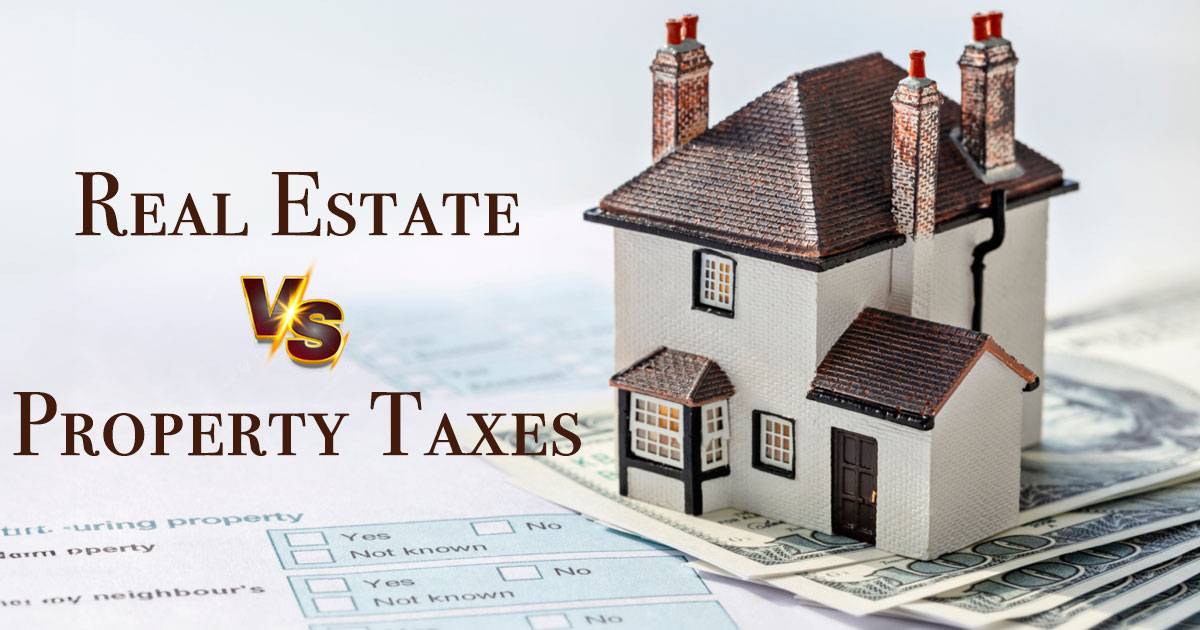Real Estate vs Property Taxes: Clearing Up the Confusion

When talking about property ownership, it involves understanding various financial aspects, including taxes. Two commonly discussed terms are “real estate taxes” and “property taxes.” Although these names are frequently used interchangeably, they mean different things. To know the distinction of each term, you need to understand the differences between real estate and property taxes.
What are Real Estate Taxes?
Real estate taxes are a specific kind of property tax. They are charged on both land and buildings. Local governments utilize these taxes to pay for important services like schools, roads, and emergency services.
This is how real estate taxes work: The amount you owe is determined by your property’s assessed value and the applicable local tax rate. For example, if your home is worth $200,000 and the local tax rate is 1%, you would pay $2,000 in real estate taxes for the year.
Purpose of Real Estate Taxes
Real estate taxes play a crucial role in supporting community services. Here’s how the funds are used:
- Education: Money from real estate taxes helps pay for public schools and educational programs.
- Public Safety: These funds support police, fire departments, and emergency services.
- Infrastructure: Taxes contribute to the upkeep and improvement of roads, parks, and public facilities.
- Local Government Operations: They also help cover the costs of running local government offices and services.
What are Property Taxes?
The term “property tax” is broader and includes various types of taxes related to property ownership. While real estate taxes are a form of property tax, property taxes can also include personal property taxes.
Personal property taxes are levied on moveable assets such as vehicles, boats, and commercial equipment. Unlike real estate taxes, which apply to land and buildings, personal property taxes apply to items that can be moved. For example, if you possess a car, you may have to pay personal property taxes on it.
Types of Property Taxes
There are two main types of property taxes:
- Real Estate Taxes: These are taxes on immovable properties like land and buildings. They are used to fund community services such as schools and public safety.
- Personal Property Taxes: These taxes apply to moveable goods including cars, boats, and equipment. The rates for personal property taxes can be quite different from those for real estate taxes.
Take note that personal property tax is different from real estate tax. Personal property tax is for things like cars and equipment, and it’s based on their value, which can go down over time. The real estate tax is for land and buildings, and it’s based on their current market value.
What’s the difference between real estate taxes and property taxes?
Property tax and real estate tax are not the same. Here are some key differences between real estate taxes and property taxes:
Definition:
Real estate taxes: Apply to immovable properties such as land and buildings.
Property taxes: Encompass both real estate taxes and personal property taxes.
Taxing Authority:
Real estate taxes: Imposed by the local government.
Property taxes: Imposed by state or local governments.
Examples:
Real Estate Taxes: Paid by homeowners for their houses.
Property Taxes: Includes fees for vehicle registration.
Assessment Basis:
Real Estate Taxes: Based on the current market value of real estate.
Property Taxes: Includes both the market value of real estate and the depreciated value of personal assets.
Impact for Homeowners
Knowing the difference between these types of taxes helps homeowners plan their budgets better.
- Financial Planning: Homeowners should include both real estate and any possible personal property taxes in their yearly budget. It’s helpful to get advice from a financial expert to understand how these taxes affect your finances.
- Tax Deductions: Real estate taxes could be deductible from your federal income tax. However, since the Tax Cuts and Jobs Act of 2017 limits this deduction to $10,000 for married couples or $5,000 for single filers, it’s important to know your total tax situation.
Real estate and property taxes are not the same.
Knowing the differences between real estate taxes and property taxes is essential for homeowners to arrange their finances effectively. Real estate taxes apply only to land and buildings, whereas property taxes can include both real estate and personal property taxes on moveable goods. Learning these distinctions helps you budget accurately and manage your finances better. Additionally, being aware of possible tax deductions and limits, such as those set by the Tax Cuts and Jobs Act, ensures you’re well-prepared for your annual tax obligations.
